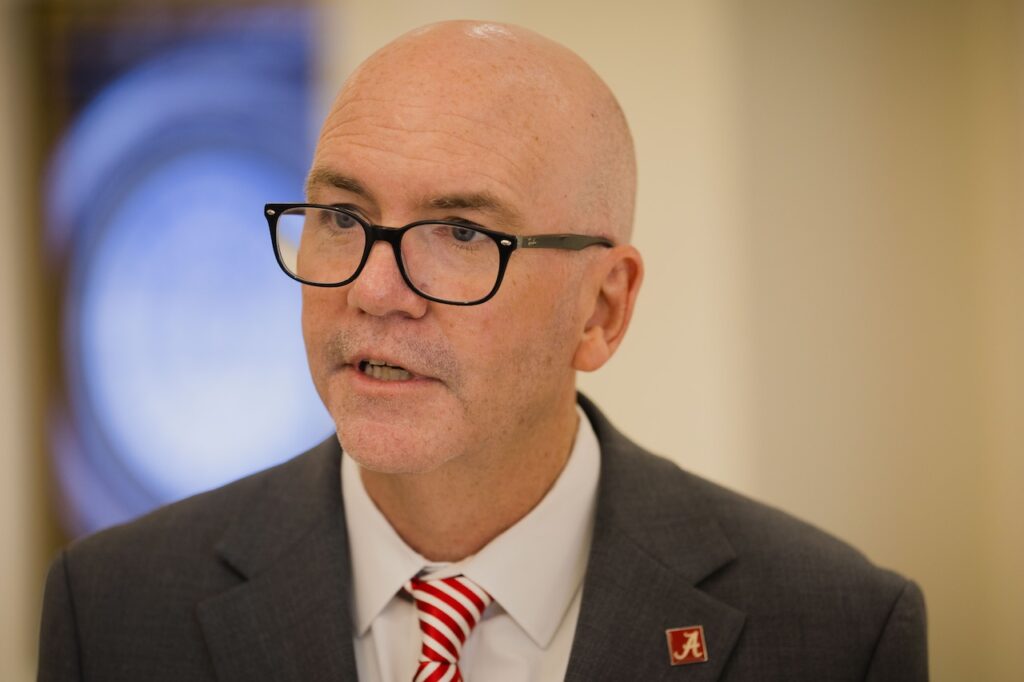Peter Mohler, an administrator and researcher at the Ohio State University, will become the University of Alabama’s next president.
He will begin his term July 21. Mohler replaces outgoing President Stuart Bell, who has led the university for 10 years.
Mohler currently serves as the vice president for research at Ohio State, where he also served as the college’s acting president in 2023. He’s also the chief scientific officer of OSU’s Wexner Medical Center.
“The future at the Capstone is incredibly bright, and I can’t wait to get started,” he said to applause Monday at an event announcing his appointment.
Personal background
Mohler grew up in Grand Junction, Colorado. He told a local newspaper that he attended public schools and was encouraged to pursue his interest in science.
He met his wife Nancy while pursuing a biology degree at Wake Forest University.
Mohler has three children: Eleanor, Caroline and John.
Academic, leadership resume
Mohler has more than 20 years of experience in higher education leadership and research.
Mohler earned a PhD in cell and molecular biology from the University of North Carolina in 2000 and completed a postdoctoral fellowship at Duke University’s Howard Hughes Medical Institute.
His research portfolio includes more than 275 publications, and features award-winning studies on heart arrhythmia in children.
From Duke, he was appointed to several teaching roles at medical departments at the University of Iowa and Vanderbilt University. He joined Ohio State in 2012 and he spent nearly 15 years at the university’s medical center, where he held several leadership roles.
Under Mohler’s leadership, Ohio State has risen in national research rankings, and research and development expenditures have increased by as much as $600 million annually, according to a news release. A local business journal called him a “research czar” and credited him for elevating the college’s national reputation.
Mohler also supported more than $100 million in gifts to the university and helped establish a new innovation district that works to promote collaboration across public, private and academic sectors.
Mohler has been named a Pew Scholar, an Outstanding Investigator of the American Heart Association and an NIH National Heart Lung and Blood Institute Outstanding Investigator. He also has served on the editorial boards of several academic journals.
“The heart of my work has always been about one thing: bringing people together to create impact, building strong interdisciplinary teams with a common purpose, and a deep focus on outcomes that matter,” Mohler said.
In a post on X, OSU president Ted Carter congratulated Mohler on his appointment.
“Peter has been a trusted and visionary leader at Ohio State for almost 15 years, and I’m grateful for his advice, friendship, and commitment to excellence,” Carter wrote. “The University of Alabama is in good hands.”
A vision for Alabama’s flagship
Mohler has big ambitions for the University of Alabama. In his remarks Monday, he said the college is “distinctly positioned” to become the nation’s “premier public flagship university.”
“Athletics is really the front door of the university,” he added to reporters after the announcement. “…athletics is incredible and will continue to be incredible, but all the great things that are happening beyond that front door – that’s what gets me excited.”
While serving as interim president at OSU, Mohler addressed several high-profile incidents on campus, including protests and calls for disinvestment over the Israel-Hamas war. UA’s Board of Trustees has not responded to similar demands from campus activists.
In his initial remarks Monday, Mohler called on the campus community to “recommit ourselves to our unique public mission,” stating that he believed college campuses are key places for civil discourse and exploring new ideas.
“I think, if you look back in history, this time is not unique, right?” he told the Tuscaloosa News after the announcement. “We go through changes in administration, and it’s our job as leaders to talk about the importance of, and really show the great things that are happening, at the university, in job creation, student success, leadership, great athletics, and delivering for the state.
“I think it’s really going to be important that we tell that story, and tell it widely and broadly, of not just what’s happening in higher education, but what’s actually happening here in Tuscaloosa that delivers on our promise of higher education.”

